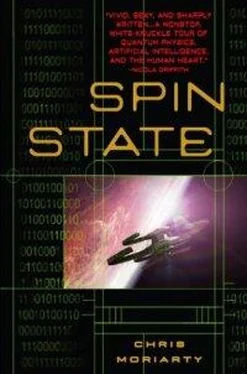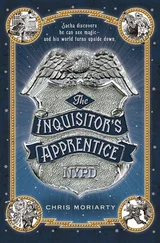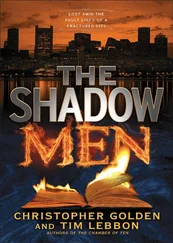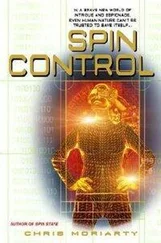Li felt the taut, held-breath quality of the air as soon as she stepped out of the pit office. Fifty meters away, a ragged line of men and women ranged along the spine of a tailing pile. Some held homemade signs. A few carried primitive, home-brewed weapons. Strikers. Wildcats, technically, since there was no legal union in the Anaconda.
She blinked wind tears out of her eyes and squinted through the blowing grit. In a brief slacking of the wind she read the signs they held:
JUSTICE FOR CORPORATE BABY KILLERS!
HOW MANY MUST DIE?
SHUT THE TRINIDAD BEFORE IT KILLS AGAIN.
She wondered why they didn’t come closer, get within shouting distance. Then she saw the row of blue uniform shirts facing the picket line. Company guards. With riot guns.
“Think the spins have picked that up yet?” someone said.
Haas was already jogging over to the guards. He leaned into the wind, cupping a hand around his mouth, and shouted something in the squad leader’s ear. He stepped back, and the line of guards advanced, firing their guns into the air.
A few of the strikers backed off. The rest didn’t.
The guards fired again, this time at the strikers’ feet. One woman cried out as if she’d been hit. Another shouted, “There are children here!”
“No one needs to get hurt!” one of the guards called, his voice shaking with adrenaline. “Don’t do anything stupid!”
And then, for no reason Li could put her finger on, the crisis passed.
The strikers lowered their signs. The guards uncocked their rifles. The crowd broke up and straggled back along the rutted track to Shantytown. Li felt a spasm of relief. No one was going to die. Not today, anyway.
Three hours later, the smell of the mine still on her hair and skin, Li stood in front of the security seal on the door of Sharifi’s quarters. The tape read her palm implant, dissolved, re-formed behind her as she stepped through.
Sharifi’s quarters were cramped, utilitarian, not much different from Li’s own room a few spokes away. The whole room was no wider than the corridor outside. Five steps took Li from the entrance to the door of the cramped bathroom. A shallow closet ran the length of the left wall. The right wall held a narrow bunk and a drop-down desk cluttered with datacubes and loose stacks of microfiche.
The closet held a few changes of practical-looking clothes, some of them still folded neatly in an Italian-made leather bag that must have cost more than Li made in a month. No family pictures. No personal items. No makeup. Except for the single dress suit hanging in the closet, it was hard to identify even the sex of the room’s last occupant. Whoever Sharifi had been, there was little trace of her here.
On an impulse, Li slipped the suit jacket on and looked curiously at herself in the mirror. It bound around the armpits; she carried a lot more muscle than Sharifi had. It was a little long. But then, Sharifi had been a good two centimeters taller than her—better nutrition and fewer cigarettes. Other than that, it fit. And the color looked good on her. No surprise there.
The smell was a surprise, though. Foreign. A touch of the other woman’s perfume, perhaps. And yet, beneath it, something unnervingly familiar. A memory surfaced, rolled over and sank again. A dog lunging and snarling at a passing miner. The warm glow of hate on its master’s face as he said, You can smell them, can’t you?
Next to the closet door were the light and livewall controls and the viewport dimmer. Li cleared the floorport, looked down at the planet between her toes, and thought about how the sweep of UN politics and her own life had intersected there. How could they all still be fighting the same battle that was hacked into the burnt-out shells of the birthlabs, the forty-year-old artillery scars fading on the hillsides above Shantytown?
For decades the now-crumbling industrial park had turned out a continuous stream of constructs. Industrial-grade genesets specifically engineered for hard-rock mining, steel smelting, terraforming—all the hard, dangerous jobs that humans couldn’t or wouldn’t do. Sharifi was tanked in those labs. Li herself had been tanked in one of the last production runs before the Riots. It was only the rawest, quirkiest chance that either of them got off-planet; Sharifi adopted by rich Ring-side abolitionists, Li farmed out to a childless miner’s family in one of the last abortive attempts to assimilate constructs into the general population.
The Riots hit eight months after Li was born—about the time Sharifi would have been in university. Shantytown became a battlefield, a maze of tunnels and barricaded cul-de-sacs in which a ragtag band of constructs held off the UN and the planetary militia… for a while, anyway.
A good number of posthumans had joined the rebels. Idealistic students from the university in Helena, back when there still was one. Miners who didn’t care who they shared Compson’s World with as long as it wasn’t the multiplanetaries. The Real IRA, though word on the street in Shantytown had always been that that was purely a money deal. When the dust cleared, Compson’s World was under martial law and the rebel constructs had escaped to a remote system that they renamed Gilead.
For the rest of Li’s life, the fight against the Syndicates dominated human politics. The breakaway constructs created the first fully syndicated genelines. KnowlesSyndicate was born, and then Motai and Bartov and the half dozen others whose names soon became words of fear throughout UN space. The Syndicates annexed one restless colony after another, until they held the whole long arc of the Periphery between Metz and Gilead. Antigenetic sentiment gained ground in the Assembly and on the streets of every UN planet. The word construct took on a new and sinister meaning, while the corporations that built the original constructs either closed up shop and abandoned them or went bankrupt in the spate of scandals that followed the breakaway. And every time another ex-colony went over to the Syndicates the UN’s antigenetic faction gained a few seats in the Assembly.
The Assembly passed the Zahn Act when Li was fourteen, placing all full genetics in UN space under direct Security Council supervision, barring them from the civil service and the military, revoking passports and imposing mandatory registration.
Li’s adoptive parents delayed, hoping the massive destruction of records during the Riots might mean she’d been forgotten. The delay paid off. By the time the registration bureaucracy caught up with them, Li’s mother had a signed and stamped death certificate that said her only daughter had died of vitamin A deficiency—and Li was already making a name for herself in the trenches of Gilead.
Meanwhile the Syndicates did… well, no one knew what they did. No subject of the Syndicates came to UN space. No UN citizen went to the Syndicates. No news escaped from the orbital stations that circled the remote Syndicate homeworlds. The Syndicates had no press and no visible government, unless you counted the shadowy point committees of the individual genelines. They had no political parties or political dissidents. No parents. No children. And, above all, no property.
Only the Syndicates owned things, and the things they owned were their constructs. They owned their minds, their bodies, their labor, everything. Each construct gave him- or herself completely, intimately—and, if the propaganda was to be believed, willingly. It was not enough to say that they didn’t want freedom. They didn’t believe in freedom. They had, as their political philosophers were endlessly proclaiming, evolved beyond it.
Only when Li met her first postbreakaway constructs in the interrogation rooms on Gilead did she begin to understand this. They seemed to belong to some other species, one that had nothing to do with humans. The first ten identical prisoners came in, and people commented on them, wondered about them, perhaps even felt sorry for them. Then the next hundred, the next thousand, the next three thousand arrived, and the wondering turned to fear and revulsion. Words failed in the face of such cold, impersonal, mass-produced perfection. Compassion failed. Belief in the universality of human nature failed. Everything failed.
Читать дальше












